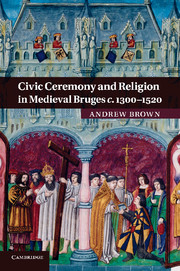Book contents
- Frontmatter
- Contents
- List of figures
- List of maps
- Acknowledgments
- List of abbreviations
- Note on currency and monies of account
- Introduction
- 1 The Holy Blood procession
- 2 General processions
- 3 Feast days and liturgical commemoration
- 4 Guilds: feast, festivity and public worship
- 5 Guilds and civic government
- 6 Civic charity
- 7 Civic ceremony, religion and the counts of Flanders
- Conclusion and epilogue: civic morality c. 1500
- Appendices
- Bibliography
- Index
5 - Guilds and civic government
Published online by Cambridge University Press: 03 May 2011
- Frontmatter
- Contents
- List of figures
- List of maps
- Acknowledgments
- List of abbreviations
- Note on currency and monies of account
- Introduction
- 1 The Holy Blood procession
- 2 General processions
- 3 Feast days and liturgical commemoration
- 4 Guilds: feast, festivity and public worship
- 5 Guilds and civic government
- 6 Civic charity
- 7 Civic ceremony, religion and the counts of Flanders
- Conclusion and epilogue: civic morality c. 1500
- Appendices
- Bibliography
- Index
Summary
The veneration of the Holy Blood relic in Bruges had long been civic-wide, but by the fifteenth century it had also become the responsibility of a particular guild. On 20 June 1406 the town treasury paid £40 parisis to the fraternity of the Holy Blood to help towards its costs in making a large iron grille in St Basil's chapel to place before the relic. This is (almost) the first reference to a fraternity that, like the Holy Trinity guild, enjoyed a special relationship with civic government. Later statutes (from 1449) and accounts (from 1469) show its membership to be tightly bound up with that of the town council. Only twenty-six members were permitted at any one time, mirroring the number of officials who served on the two benches of the town magistracy; most of them became members after a period of service on the town council. The guild had special duties on Holy Blood day: all members were to attend wearing the guild livery on the main procession, from the moment the relic left the chapel until it returned.
The connections of the Holy Blood guild with civic ceremony and authority were unique, yet there were many ways in which other guilds were bound up with the task of municipal government. The links of craft- or devotional-guild members to holders of civic office, the investment made by the town treasury in certain guild festivity, the contribution that guilds made to civic prestige outside the town and to the ‘common good’ within: in all these areas guilds were called upon to play an increasingly public role.
- Type
- Chapter
- Information
- Civic Ceremony and Religion in Medieval Bruges c.1300–1520 , pp. 167 - 194Publisher: Cambridge University PressPrint publication year: 2011



